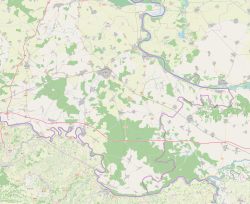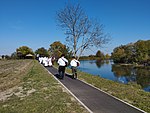Markušica
Markušica
| |
|---|---|
| Municipality of Markušica Općina Markušica Општина Маркушица | |
Villages of the Markušica Municipality | |
 | |
| Coordinates: 45°22′26″N 18°42′22″E / 45.373766°N 18.706208°E | |
| Country | |
| Region | Slavonia |
| County | |
| Government | |
| • Municipal mayor | Tihomir Kolarević (SDSS) |
| Area | |
| 73.8 km2 (28.5 sq mi) | |
| • Urban | 22.2 km2 (8.6 sq mi) |
| Population (2021)[3] | |
| 1,773 | |
| • Density | 24/km2 (62/sq mi) |
| • Urban | 733 |
| • Urban density | 33/km2 (86/sq mi) |
| Demonym(s) | Serbo-Croatian: Markušičanin (♂) Serbo-Croatian: Markušičanka (♀) (per grammatical gender) |
| Time zone | UTC+1 (CET) |
| Official languages | Croatian, Serbian[4] |
| Website | markusica |
Markušica (Serbian Cyrillic: Маркушица,[5] Hungarian: Márkusfalva, German: Sankt Markus) is a village and a municipality in Vukovar-Syrmia County in eastern Croatia. Markušica is located south of the river Vuka and northwest of the town of Vinkovci. The landscape of the Markušica Municipality is marked by the Pannonian Basin plains and agricultural fields of wheat, maize, common sunflower and sugar beet.
The modern day municipality was established in 1997 by the UNTAES administration as one of new predominantly Serb municipalities in order to ensure access to local self-government to Serb community in the region. Alongside Markušica it includes the villages of Gaboš, Karadžićevo, Ostrovo and Podrinje. Before the United Nations administrator implemented anty-gerrymandering reorganization, Markušica and Podrinje were a part of the Tordinci Municipality, while Karadžićevo, Ostrvo and Gaboš were linked to Jarmina Municipality making Serb community minority in both of them.
Markušica Municipality is connected with the surrounding area via D518 road and L209 Vinkovci–Gaboš–Osijek railway, with local stations in Gaboš and Ostrovo.
Geography
[edit]The municipality has a total area of 74.29 km2 (28.68 sq mi).[6] River Vuka flows through the municipality and territory of the municipality is completely flat, very fertile black soil. It is connected by D518 highway with the rest of the country.
History
[edit]One Scordisci archaeological site in Markušica dating back to late La Tène culture was excavated in the 1970s and 1980s as a part of rescue excavations in eastern Croatia.[7] Archaeological site was a part of the settlement network of Scordisci in the area of Vinkovci.[7]
Markušica was one of the feudal villages that existed in the region before the Ottoman rule in Hungary.[8] After the end of Great Turkish War the village was settled by Eastern Orthodox Vlachs from surrounding areas and the eastern Bosnia.[8] In 1736 there were 40 inhabited houses in Markušica.[8] In 1866 this number increased at 192 houses and 1003 inhabitants out of which 902 were Eastern Orthodox.[8]
Colonist settlements of Ada, Gaboš, Križevci, Podrinje, and Šodolovci were established on the territory of the village municipality during the land reform in interwar Yugoslavia.[9]
The modern day Municipality of Markušica was established by the decision of the United States diplomat and at the time Transitional Administrator for Eastern Slavonia, Baranja and Western Sirmium Jacques Paul Klein. As the region was directly governed as an UN protectorate Transitional Administrator was the highest authority responsible for administrative affairs. Markušica Municipality was established as one of new predominantly Serb municipalities in order to ensure access to local self-government to Serb community in the region. Prior to the decision, the international community expressed concerns over the perceived gerrymandering, disenfranchisement of refugees and minority representation.[10]
Demographics
[edit]Population
[edit]There are 2 555 inhabitants, the majority of the population which are Serbs, who make up 90.10% of the population according to the 2011 population census.[11]
Languages
[edit]Due to the local minority population, the Markušica municipality prescribes the use of not only Croatian as the official language, but the Serbian language and Serbian Cyrillic alphabet as well.[12][13]
Religion
[edit]Most of the population are Serbian Orthodox that are practicing their religion in the church that was built in 1810 and re-built in 1989.[citation needed]
Politics
[edit]Joint Council of Municipalities
[edit]The Municipality of Markušica is one of seven Serb majority member municipalities within the Joint Council of Municipalities, inter-municipal sui generis organization of ethnic Serb community in eastern Croatia established on the basis of Erdut Agreement. As Serb community constitute the majority of the population of the municipality it is represented by 2 delegated Councillors at the Assembly of the Joint Council of Municipalities, double the number of Councillors to the number from Serb minority municipalities in Eastern Croatia.[14]
Municipal government
[edit]The municipality assembly is composed of 13 representatives, plus additional seats for municipality minority groups if they don't get the proportional number of seats. Assembly members come from electoral lists winning more than 5% of votes. The dominant party in the municipality since the reintegration of eastern Slavonia in 1998 is Independent Democratic Serb Party. 681 or 33,32 % out of 2.044 voters participated in 2017 Croatian local elections with 93,69 % valid votes.[15] With 92,80% and 632 votes, Budimir Brača from Independent Democratic Serb Party was elected as municipality major.[15] As of 2017, the member parties/lists are:
| Party | Votes | % | Seats | ||||
|---|---|---|---|---|---|---|---|
| Independent Democratic Serb Party | 638 | 100,00 | 13 | ||||
| Invalid/blank votes | 43 | 6,31 | — | ||||
| Total | 681 | 100 | — | ||||
| Registered voters/turnout | 2.044 | 33,32 | — | ||||
 | |||||||
| Source[15] page 57-58 (in Croatian) | |||||||
Minority councils
[edit]Directly elected minority councils and representatives are tasked with consulting tasks for the local or regional authorities in which they are advocating for minority rights and interests, integration into public life and participation in the management of local affairs.[16] At the 2023 Croatian national minorities councils and representatives elections Serbs of Croatia fulfilled legal requirements to elect 10 members minority councils of the Markušica Municipality.[17]
Economy
[edit]Markušica is an underdeveloped municipality which is statistically classified as the First Category Area of Special State Concern by the Government of Croatia.[18]
Culture
[edit]Points of Interest
[edit]Markušica Municipality is famous for a monument dedicated to a soldier killed in World War II. The village has a unique monument to a female Soviet pilot from the Red Army, who fought against the Nazis and whose plane was shot down here. The village also has an Eastern Orthodox Church from 1810, which was damaged in the war in Croatia.[clarify]
Associations and Institutions
[edit]The village has a volunteer fire department.[19]
Settlements
[edit]The municipality consists of the following settlements:[20]
- Gaboš, population 516
- Karadžićevo, population 194
- Markušica, population 1,009
- Ostrovo, population 612
- Podrinje, population 224
See also
[edit]References
[edit]- ^ Government of Croatia (October 2013). "Peto izvješće Republike Hrvatske o primjeni Europske povelje o regionalnim ili manjinskim jezicima" (PDF) (in Croatian). Council of Europe. p. 36. Retrieved 30 November 2016.
- ^ Register of spatial units of the State Geodetic Administration of the Republic of Croatia. Wikidata Q119585703.
- ^ "Population by Age and Sex, by Settlements" (xlsx). Census of Population, Households and Dwellings in 2021. Zagreb: Croatian Bureau of Statistics. 2022.
- ^ Četvrto izvješće Republike Hrvatske o primjeni Europske povelje o regionalnim ili manjinskim jezicima, page 61., Zagreb, 2009
- ^ "Minority names in Croatia:Registar Geografskih Imena Nacionalnih Manjina Republike Hrvatske" (PDF). Archived from the original (PDF) on 2013-10-29. Retrieved 2013-03-08.
- ^ "Archived copy" (PDF). Archived from the original (PDF) on 2016-01-28. Retrieved 2016-01-22.
{{cite web}}: CS1 maint: archived copy as title (link) - ^ a b Dizdar, Marko (2016). "Late La Tène Settlements in the Vinkovci Region (Eastern Slavonia, Croatia): Centres of Trade and Exchange" (PDF). Boii - Taurisci: Proceedings of the International Seminar, Oberleis-Klement, June 14th-15th, 2012. Austrian Academy of Sciences Press: 31–48. Retrieved 22 January 2019.
- ^ a b c d Marković, M. (2003). Istočna Slavonija: Stanovništvo i naselja. Naklada Jesenski i Turk. Zagreb.
- ^ Šimončić-Bobetko, Zdenka (1990). "Kolonizacija u Hrvatskoj 1919.—1941. godine" [Colonization in Croatia Between 1919 and 1941]. Povijesni prilozi (in Croatian). 9 (9). Zagreb: Hrvatski institut za povijest: 160–162. ISSN 0351-9767.
- ^ Benjamin Ward (December 1999). Croatia's Democracy Deficit: A Pre-electoral Assessment (PDF) (Report). Human Rights Watch. Retrieved 29 August 2020.
- ^ "Population by Ethnicity, by Towns/Municipalities, 2011 Census: County of Vukovar-Sirmium". Census of Population, Households and Dwellings 2011. Zagreb: Croatian Bureau of Statistics. December 2012.
- ^ Izvješće o provođenju ustavnog zakona o pravima nacionalnih manjina i o utošku sredstava osiguranih u državnom proračunu Republike Hrvatske za 2008. godinu za potrebe nacionalnih manjina, Zagreb, 2009.
- ^ "Archived copy" (PDF). Archived from the original (PDF) on 2013-10-29. Retrieved 2013-03-08.
{{cite web}}: CS1 maint: archived copy as title (link) - ^ "Konstituisan 6. saziv Zajedničkog veća opština l" (in Serbian). Zagreb: Privrednik. 1 August 2017.
- ^ a b c "Informacija o izborima članova predstavničkih tijela jedinica lokalne i područne (regionalne) samouprave i općinskih načelnika, gradonačelnika i župana te njihovih zamjenika - 2017 (Vukovarsko-srijemska županija)" (PDF) (in Croatian). Archived from the original (PDF) on 16 January 2018. Retrieved 15 January 2018.
- ^ "Manjinski izbori prve nedjelje u svibnju, kreću i edukacije". T-portal. 13 March 2023. Retrieved 2 May 2023.
- ^ "Informacija o konačnim rezultatima izbora članova vijeća i izbora predstavnika nacionalnih manjina 2023. XVI. VUKOVARSKO-SRIJEMSKA ŽUPANIJA" (PDF) (in Croatian). Državno izborno povjerenstvo Republike Hrvatske. 2023. p. 17. Retrieved 3 June 2023.
- ^ Lovrinčević, Željko; Davor, Mikulić; Budak, Jelena (June 2004). "AREAS OF SPECIAL STATE CONCERN IN CROATIA- REGIONAL DEVELOPMENT DIFFERENCES AND THE DEMOGRAPHIC AND EDUCATIONAL CHARACTERISTICS". Ekonomski pregled, Vol.55 No.5-6. Archived from the original on 18 August 2018. Retrieved 25 August 2018.
- ^ "Archived copy" (PDF). Archived from the original (PDF) on 2012-04-30. Retrieved 2011-10-15.
{{cite web}}: CS1 maint: archived copy as title (link) - ^ "Population by Age and Sex, by Settlements, 2011 Census: Markušica". Census of Population, Households and Dwellings 2011. Zagreb: Croatian Bureau of Statistics. December 2012.
















